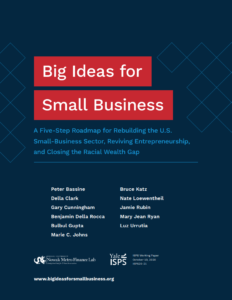 Big Ideas for Small Business
Big Ideas for Small Business
Drexel University Nowak Metro Finance Lab, Yale ISPS
First published October 2020
Small Businesses in America are in a Crisis. Since COVID-19 hit in February, 2020, almost 25% of all U.S. small businesses have closed at least temporarily. In the hardest hit sectors, like restaurants, hotels, and retail, the numbers are far higher. In September, Yelp reported that for businesses on its platform, 60% of closures were permanent. Those closures have left millions of Americans out of work, transformed lively neighborhoods around the country into retail graveyards, and destroyed the wealth built by many families over generations.
The devastation of COVID-19 has forced the country to take stock of our small-business sector. Small businesses drive our economy, employing 47% of the U.S. workforce, generating two-thirds of new jobs, and serving as a critical path to economic self-sufficiency. Small businesses animate our neighborhoods, reflecting, embodying and sustaining the unique cultural fabric of their communities. But notwithstanding their critical role, small businesses have never been a central focus for federal policymakers. As a result, the federal government did not have the expertise or resources to meet the exigencies of the COVID-19 pandemic, as evidenced by the troubled launch and execution of the Paycheck Protection Program (PPP).
The storms of COVID-19 were a fierce blow to an economic sector already battered by the unrelenting winds of economic centralization. Since the late 1990s, more than two-thirds of all U.S. industries have grown more consolidated, from dog food to airline travel. Even more strikingly, the rate of business creation has fallen by half since the 1970s. Entrepreneurs of color, meanwhile, have continued to struggle against structural constraints. While Black Americans are 12.3% of the U.S. population, they own only 2% of U.S. small businesses. Latinx Americans are similarly underrepresented. From the challenges of finding equity to launch a new venture to the difficulties in accessing bank credit for expansion, minority entrepreneurs must climb a far steeper path than their white counterparts. Because minority businesses operate with less capital, they are also more susceptible to the financial pressure of COVID-19. The Federal Reserve of New York reported that from February to April the number of Black businesses declined by 41 percent.
Download Resource